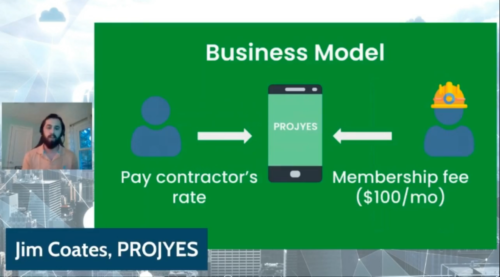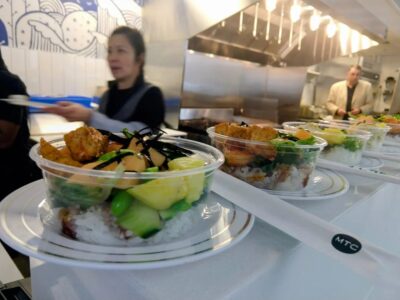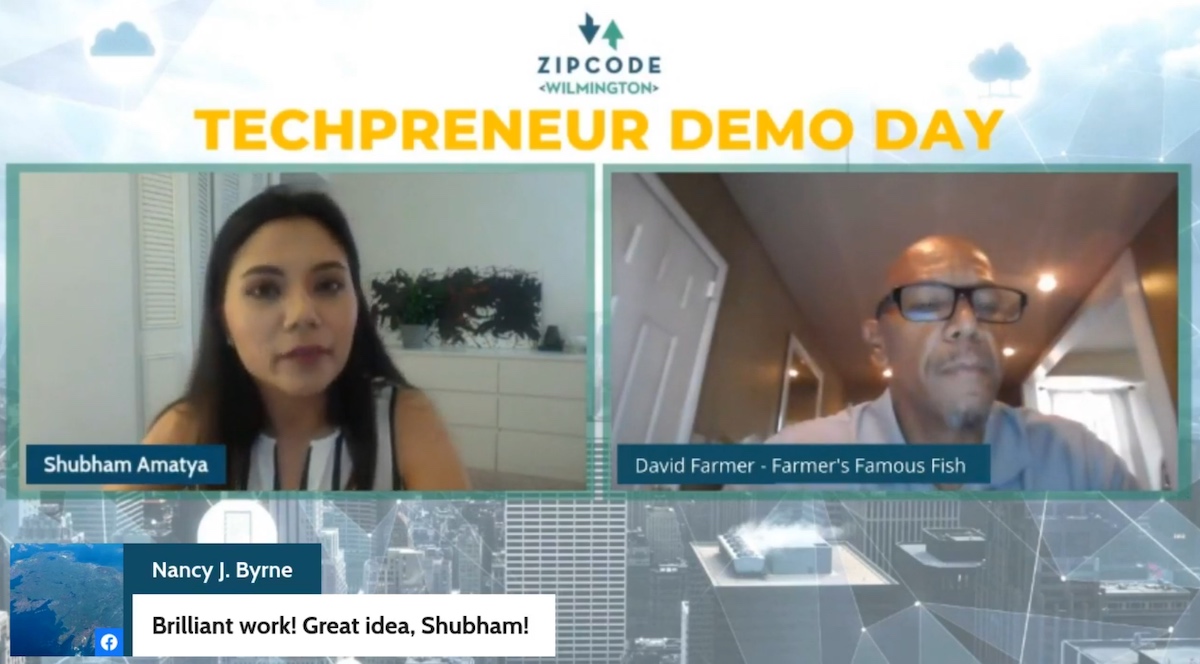After nine months of business development, coding ideation and pitch development Zip Code Wilmington’s first TECHPRENEUR cohort finished with a virtual Demo Day on Monday.
The pilot program combined technical skills with business development, with some participants simultaneously completing Zip Code’s coding bootcamp. It was designed for people who have ideas for tech-based businesses, but don’t have the coding knowledge to to it themselves, and don’t have the money to hire developers to do it. TECHPRENEUR was launched in November and funded by a New Castle County Innovation Grant using county-allotted CARES Act funds.
Four startups were pitched during the wrap-up event, followed by Q&A sessions with members of the Delaware business community, including Matt Saponaro of A.I. Whoo, Bryce Fender of WilmInvest and David Farmer of Farmer’s Famous Fish.
“We intentionally brought in specific people to pair with our entrepreneurs to shine a light on other local businesses that are five or 10 steps ahead with their business,” said Desa Burton, executive director for Zip Code Wilmington.
Lee Givhan, who spent most of his career in the music industry, touring and working with artists like The Roots and Common, took on both the coding bootcamp and the entrepreneur program. He got the idea for his platform, YENTA, when he saw the impact COVID-19 had on his touring musician friends. With live shows canceled, they relied on social media for exposure in a way they never had before. YENTA uses a data-driven methodology to create recommendations to help users’ social media platforms grow. It’s in its early stages, but, Givhan said, people who have relied on touring have been receptive to it.
The TECHPRENEUR program changed the way he looked at starting a business, Givhan told Technical.ly.
“Most impactful for me were the talks from entrepreneurs,” he said. “It really shifted my view of what it means to be a business owner. I’d never thought about how much of it is asking questions and listening to people. [First Founders founder Garry Johnson] said he had sticky notes on his wall from all the things people had told him, and he said there was a sticky note that stood out to him and he ended up making a business off of that one sticky note.”
What I've gotten out of this group was to talk about my ideas to a group of people who are different from me.
“Zip Code showed me that it is possible to be a software engineer and work in these spheres, especially in the fintech area,” Givhan said. “Meeting all of these entrepreneurs showed me [being a founder] is possible, too.”
Some of the other entrepreneurs and experts who gave talks over the course of the program included Russ Kliman of SEI Investments, Jedi Weller of OpenForge, Van Hampton of True Access Capital and entrepreneur and investor Pedro Moore.
Michael Schoenbeck, a 2019 graduate of the Zip Code coding bootcamp, has done work with the B1ue N0te program, a public school partnership between Zip Code, InterDigital and the Delaware Department of Education that was added to computer science Pathways at three Delaware high schools in the 2020-2021 school year. His startup, You Should Code, is designed to teach coding to toddlers as young as two.
The access to feedback provided by TECHPRENEUR made a big difference in how he approached business development, Schoenbeck said.
“I’m the type of person that has ideas all the time, that’s just how my brain works,” he said. “Ninety-nine percent of my ideas don’t work out, and a big part of that is because a lot of my ideas [only] fit me and what I want. What I’ve gotten out of this group was to talk about my ideas to a group of people who are different from me, so there are different experiences that are able to factor in on my ideas.”
Jim Coates went from working for a tech startup to construction, which led him to develop an app called PROJYES, where DIYers can connect with contractors to get help with part of a project. Unlike similar apps that provide answers to questions from experts, PROJYES is localized, so someone working on a small project who needs advice — but doesn’t want to hire a contractor for the whole job — can pay a nearby contractor for a Zoom call based on an hourly rate. Through building small relationships between contractor and client, Coates said, the client gets to know and trust someone in town should a larger project come up.
The business model would charge contractors monthly subscriptions, while DIYers can use the service for free and pay the contractor directly.
“I’m looking for guidance on having two types of clients,” he said.

Jim Coates presented PROJYES. (Screenshot)
The final presenter, a software engineer with Comcast and former social worker Shubham Amatya, is looking to reduce food waste with her Copper Pot app.
“I grew up in Nepal,” she said. “My family has a restaurant bakery, and at the end of the day it would sell surplus items for 50% off.” The goal is to connect restaurants and farmers with people who are food insecure to purchase surplus items at a discount. Amatya plans to start with local farmers to pilot the program.
While Zip Code will continue to support the entrepreneurs, they are now at a new stage where they will begin looking for funding, investors and next-level incubation.
“Most incubators don’t start with developing an idea, you usually have to have something together before you can join,” said Burton. “Now they have that something so they join any other incubator and continue from there.”
Join the conversation!
Find news, events, jobs and people who share your interests on Technical.ly's open community Slack

Delaware daily roundup: Delmarva Power vendor stats; DelDOT's $15M federal grant; 50 best companies to work for

Delaware daily roundup: Over 4,000 Black-owned businesses uncovered; Dover makes rising cities list; a push for online sports betting

Delaware daily roundup: Ladybug Fest illuminates small biz; Hahnemann Hospital's biotech future; intl. politics and a Middletown project


